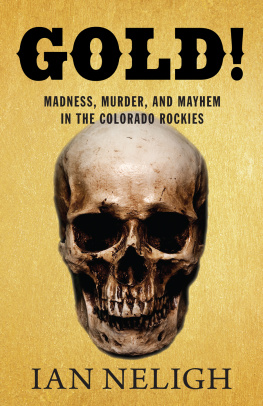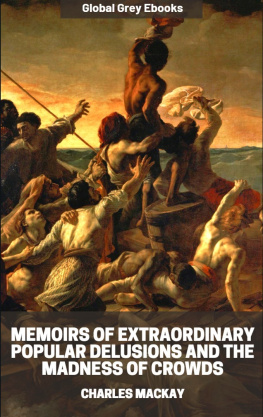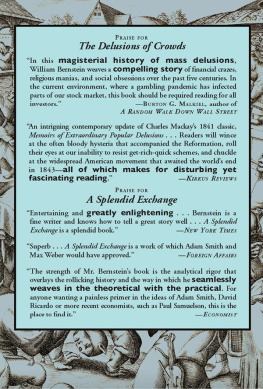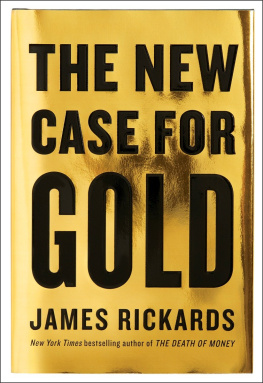Thank you for downloading this Free Press eBook.
Join our mailing list and get updates on new releases, deals, bonus content and other great books from Free Press and Simon & Schuster.
C LICK H ERE T O S IGN U P
or visit us online to sign up at
eBookNews.SimonandSchuster.com
We hope you enjoyed reading this Free Press eBook.
Join our mailing list and get updates on new releases, deals, bonus content and other great books from Free Press and Simon & Schuster.
C LICK H ERE T O S IGN U P
or visit us online to sign up at
eBookNews.SimonandSchuster.com

Free Press
An imprint of Simon & Schuster, Inc.
1230 Avenue of the Americas
New York, NY 10020
www.SimonandSchuster.com
Copyright 2014 by Ian Gold, Ph.D., and Joel Gold, M.D.
All rights reserved, including the right to reproduce this book or portions thereof in any form whatsoever. For information address Free Press Subsidiary Rights Department, 1230 Avenue of the Americas, New York, NY 10020
First Free Press hardcover edition July 2014
FREE PRESS and colophon are trademarks of Simon & Schuster, Inc.
The Simon & Schuster Speakers Bureau can bring authors to your live event. For more information or to book an event contact the Simon & Schuster Speakers Bureau at 1-866-248-3049 or visit our website at www.simonspeakers.com.
Interior design by Erich Hobbing
Jacket design by Oliver Munday
Author photographs by Natalie Stoljar
Library of Congress Cataloging-in-Publication Data Gold, Joel (Joel Todd).
Suspicious minds : how culture shapes madness / Joel Gold and Ian Gold.
pagescm
Includes bibliographical references and index.
1. Cultural psychiatry.2. Social psychiatry.3. Mental illnessI. Gold, Ian, 1962II. Title. RC455.4.E8G652014
362.2'042dc232014010820
ISBN 978-1-4391-8155-3
ISBN 978-1-4391-8157-7 (ebook)
For our parents

And for Jos
The world as it had been shown to him was a piece of unreason, an idiots dream. Yet it was on too mammoth a scale to be without some reason. He came wearily back to his original point: Since the world could not be as crazy as it appeared to be, it must necessarily have been arranged to appear crazy in order to deceive him as to the truth.... In some fashion he must get behind the deception and see what went on when he was not looking.... Obviously the first step must be to escape from this asylum.
Robert Heinlein, They
CONTENTS
ACKNOWLEDGMENTS
A great many people helped us with this book. More than anyone, we owe a debt of gratitude to Derek Webster, who helped us to find the contours of our ideas and showed us how to express them more clearly and effectively. This book is incomparably better than it would have been if we hadnt had the benefit of his insight, experience, and support.
Many friends and colleagues offered valuable suggestions and advice on our work. Were particularly grateful to James Kirkbride and Ned Shorter, who gave us a great deal of feedback on parts of the manuscript.
Were also very grateful for the help given to us by Ralph Adolphs, Alia Al-Saji, Tim Bayne, Carol Bernstein, Marie-Eve Carrier, Suparna Choudhury, Max Coltheart, Mylissa Falkner, Lisa Fielding, Cordelia Fine, Glen O. Gabbard, Sandro Galea, Michael Garrett, Brad Goodman, Edward Hagen, Mike Jay, Lawrence Joseph, Joshua Karpati, Jay S. Kwawer, Robyn Langdon, Jesse Laz, Eric Lewis, Dolores Malaspina, Eric Marcus, Janet McTeer, Nancy McWilliams, Alessandra Miklavic, Kengo Miyazono, Donatella Moltisanti, Joel Paris, Dan Posner, Benjamin J. Sadock, Jack Sava, Gilda Sherwin, Rob Stephens, and Gabrielle Weiner.
Weve been helped enormously by our research assistants Tessa Blanchfield, Alison Bruni, Emma Cusumano, Devon Kapoor, Leah Katzman, Marie Prvost, Elizabeth Scott, Brooke Struck, Judy Yeh, and Anna Zuckerman. We owe a special debt to Karina Vold. Were also very grateful to Yvan Ttreault for his work on producing the excellent figures.
We could not have finishedor even startedthis book without the help and support given to us by our agent, Max Brockman, and our editors Nick Greene, Karyn Marcus, Leah Miller, Sydney Tanigawa, and Webb Younce. Thanks are also due to all of the people at Free Press and Simon & Schuster, especially Patty Romanowski, who helped bring this book to life.
To any friends, family, or colleagues we may have overlooked, we are deeply sorry and can easily be made to feel guilty. Feel free to take full advantage of this trait (once per person, please).
I thank my teachers, colleagues, and friends at the Department of Psychiatry of the NYU School of Medicine and at the Institute for Psychoanalytic Education.
Many thanks to the staff of Bellevue Hospital Center, particularly to my partners Michael Sobel and Serena Volpp. Special thanks to the residents, who do the bulk of the work, and to my patients, who do the bulk of the teaching.
Thanks to all those who were interviewed for the book, especially Kevin Hall.
Thanks to Seth P. Stein and Rachel Fernbach of the New York State Psychiatric Association, and Rose Gasner, for their (unofficial) guidance in assuring patient confidentiality, and to Jamie Feldman for his (unofficial and ongoing) legal advice.
Thanks to Seth and Rachel Kalvert for getting the ball rolling.
Props to mentors Arthur Propst, Ren Tirol, and Mark Bear.
Tusen Takk to Jim Helfield for his great humor and friendship.
A sheynem dank to Jacob and Amalia Freud, merci bien to the Habs, and kiitos paljon to Saku Koivu.
I am indebted to Adam Karpati for his boundless support, intelligence, and great camaraderie.
I would have been unable to coauthor this book or achieve much of anything, personally or professionally, without the endless patience, guidance, and care of Robert Chalfin. I will be forever grateful.
The love of and for Yaya, whose entire life to this point has been spent with this book, and the love of and for Cathy, for whom it only feels that way, are the only reasons to bother. Je vous aime gros comme lunivers.
Any errors that remain in this work are, of course, entirely the fault of my brother.
JG
A distant ancestor of this book formed the basis for an undergraduate seminar at McGill, and Im grateful to all of the students in that class.
I am also very grateful to Jill Craigie and Cordelia Fine, early comrades in research on delusion, and to Lauren Olin, who contributed so much to my thinking about delusion long before this book was even begun.
Its enormously useful to have a German scholar for a mother-in-law. Margaret Mahony Stoljar translated a long excerpt of the memoirs of the nineteenth-century figure Friedrich Krauss, some of which appears here. Her work gave us access to an important firsthand description of a delusional illness for which Im deeply grateful.
Finally, to Natalie, Alex, and Adam (who may not believe that this book is finished even when they hold it in their hands), for their love and support, a thank-you is nothing like enough, but will have to do.
Any errors that remain in this work are, of course, entirely the fault of my brother.
IG
AUTHORSHIP NOTE
This book is coauthored, but in a number of places where the pronoun I is used, it refers to Joel. These references appear in the portraits of patients and are indicated by means of a specific attribution at the bottom, i.e., JG.
Next page










